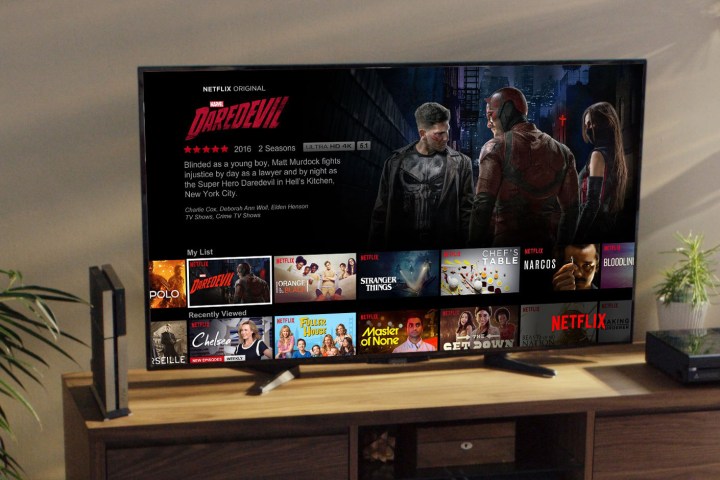
“Spielberg is such a douche.”
This was the Slack message I received from a millennial colleague after reading the recent news that the legendary director plans to get Netflix films — at least in their current release format — barred from Oscars contention at a meeting with his fellow Hollywood elite next month. It’s a succinct take on the situation, to be sure, but for slightly older film fanatics like myself, the beef between Spielberg and Netflix — one an iconic figure of the aging Hollywood guard, the other a shining beacon of the new cinematic frontier — is a bit more nuanced.
This is a battle for the very future of cinema as we know it.
For me, the current row between such powerful and disparate sides of the cinematic paradigm feels almost like being a teenager as your parents increasingly argue in the kitchen, ushering forth fears of the “D” word. “Don’t fight you guys!” cries the eternal juvenile id from deep within.
Quite frankly, I’m torn between these two sides not only because I love them both, but because both have some valid points to make. And make no mistake, while the two parties are ostensibly warring over somewhat frivolous awards ceremonies, this is emblematic of a larger philosophical battle for the very future of cinema as we know it and what can and can’t be called a film. As such, it’s worth taking a closer look at both sides of the argument.
Spielberg has a point
First, let’s talk about what Spielberg is trying to do, and why. While Spielberg has yet to comment on his plans publicly as I write this article, as Variety points out, there is little doubt as to his thoughts about the validity of Netflix films in their current state.

“Once you commit to a television format, you’re a TV movie,” Spielberg told ITV in March 2018. “You certainly, if it’s a good show, deserve an Emmy, but not an Oscar. I don’t believe films that are just given token qualifications in a couple of theaters for less than a week should qualify for the Academy Award nomination.”
More specifically, it’s been reported that Spielberg wants to push for rules that would require Netflix to put any movies eligible for awards in theaters for an undetermined window (likely four weeks or more) before they’re available on your TV screen or mobile device.
It’s easy to write off his request (demand?) as that of a petulant, out-of-touch oligarch of Hollywood past; “old director yells at cloud” and all that. But whether he’s right in his stance or not, there is method — film-adoring method — to his madness. His words are strong ones (not to mention ones that seem to be fighting a losing battle), but he’s fighting for something that movie dorks like myself still very much believe in: The very survival of the theatrical experience.
People just don’t go to the movies as much as they used to.
“But movie theater chains make billions,” you say. “They’re not going anywhere.” And, as it stands, you would be right in your argument. In fact, 2018 was a banner year for North American movie ticket sales, with more than $11.8 billion raked in, a 6.8 percent increase over the previous year. Those big bucks come as movie ticket prices have increasingly risen as theater chains upgrade theaters to combat the home theater experience, but even actual ticket sales reportedly increased in 2018 by 4.8 percent over the previous year.
If the years preceding it tell us anything, however, this figure seems more of an anomaly than a trend. While 2018 was a mega year at the movies, it followed a three-year slump that saw 2017 register as the worst year for ticket sales since 1992, according to Bloomberg. For anyone who has been paying attention to the streaming landscape, this latter trend seems to be the one writing the story going forward. Unsurprisingly, with all the options out there from Netflix and company, people just don’t go to the movies as much as they used to, leaving the very theater industry itself in a state of flux, if not all-out doubt.
While Spielberg has made a few questionable decisions in his later years (Crystal Skulls, etc.), the man is a legend for a reason. He literally invented the blockbuster with Jaws, for god’s sake, and he’s helped push film technology forward for the better part of five decades.
That hasn’t just helped theater chain conglomerates like AMC and Regal rake in the bucks, it has created astounding new experiences like Dolby Cinema and IMAX with Laser which, in turn, trickle down to the home theater industry. Your Dolby Atmos soundbar, that vivid 4K HDR screen, and the very quality of streaming and Blu-ray films can thank the theater industry for a large part of the innovations that make us all happier at home.
Even though Spielberg’s efforts to hold back the tide rather than riding the wave may be futile, Netflix isn’t without blame here, either. The company has repeatedly bucked industry standards, sometimes rightfully so — the ancient release window of two to three months is laughable in the streaming age.
But in a variety of ways, Netflix has also tried to have its cake and eat it too, playing its awards hopefuls in small-run theaters to simply fulfill a requirement, and spending tens of millions from its seeming endless font of cash on movies like Alfonso Cuaron’s Roma to sway Academy voters, a gambit that paid off with four Oscar wins for the film, including Best Director. According to IndieWire, the money bought near round-the-clock Roma awards parties, streets blanketed in billboards, and promotional gifts like $175 coffee table books, fancy chocolates, and other prizes designed to butter up Academy voters in the lead-up to the victories.
But, of course, so does Netflix
Don’t get me wrong, though. While I love the theater experience, I also love me some Netflix. And though the streamer hasn’t hesitated in its overt efforts to garner awards at (almost literally) any cost, that doesn’t take away from all the good Netflix has done for the world of cinema in recent years.
As any indie filmmaker will tell you, since Netflix’s content boss Ted Sarandos started showering film festivals with big checks, indie filmmaking has seen an incredible renaissance that simply wouldn’t — or couldn’t — have happened in the age of superhero franchise fervor at the theater.

From mumblecore darlings like the Duplass brothers to important female directors like Ava DuVernay, Netflix has given a voice to an entire generation of filmmakers who simply wouldn’t have had one without it. That’s especially true for women and people of color, who have found in Netflix a creative partner that will let them tell intimate, timely, and culturally important stories that don’t have a home in the current theatrical paradigm. And when it comes to awards like the Oscars and the Golden Globes, aren’t those the kinds of films we should be honoring?
Netflix has given a voice to an entire generation of filmmakers
That’s not to mention the convenience and affordability Netflix offers working-class folks and families, for whom a night out at a quality theater — if there’s even a quality theater within their reach — can come at a cost that’s nearly prohibitive. Netflix allows more people to see more films, more filmmakers to make better films, and more films, in general, to become possible. That’s no small feat, and one worth recognizing and celebrating, not admonishing.
Families gotta compromise
So, is there a way forward here, or will these two warring sides continue to stonewall each other into oblivion? I like to think they can come to amicable terms that will be for the benefit of all filmmakers and film lovers alike — if they can get together and talk.
In a piece I wrote in 2015 about the need for Netflix and the big four theater chains to work together, I offered several possible solutions to this impasse. Those include everything from Netflix agreeing to a longer release window — the four weeks mentioned above sounds like a solid starting point — to mutual profit sharing. Netflix could, for instance, share streaming “profits” on higher-profile releases with theater chains, or cut them in on a wider share of its ticket sales in theaters.
In any event, while Spielberg and company can’t hold back the streaming tide, Netflix can’t navigate the theater world alone, either. As with any happy and productive family, the two sides need to sit down at the table, pour a couple of glasses of wine and talk this thing out. If not for each other, then for us, the kids.
Otherwise, the still-prosperous cinematic landscape as we currently know it could be in trouble for all parties involved. And nobody wants to see a good family break up.
Editors' Recommendations
- Don’t bother sending back those final Netflix DVD rentals
- If you have a Netflix subscription, don’t sleep on the service’s games
- Hold on to your fedora! Steven Spielberg won’t direct Indiana Jones 5




